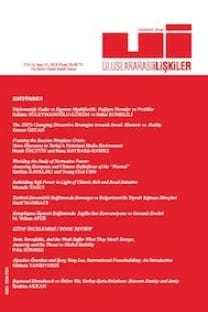Homeros'dan Hobbes ve Ötesine: "Güvenlik" Kavramının Avrupa Geleneğindeki Boyutları
Bu makale, güvenlik kavramının tarihsel gelişimini iki aşamada incelemektedir. İlk aşamada, Romalılar tarafından “securitas” biçiminde kullanılmaya başlanan, kendi içinde çelişkiler taşıyan ve dini anlamlara sahip olan kavram, Orta Çağ’ın sonunda yerini “cetritudo”ya bırakmıştır. Thomas Hobbes döneminden başlayan ikinci aşamada, modern devletin büyük paradigmatik kelimelerinden biri haline gelmiştir. Güvenlik, bu aşamada, iç savaşları önleme amacına hizmet eden otoriter devletin doğuşuyla ilişkilendirilmiştir. Bu makale, Thomas Hobbes ve Antik Yunanlı tarihçi Tukidides arasındaki bağlantıyı inceleyerek başlamakta ve kavramın bazı çağdaş dönem yazarlarınca kullanılışını gözden geçirerek devam etmektedir.
Anahtar Kelimeler:
Güvenlik, Securitas, Hobbes, Tukidides.
From Homer to Hobbes and Beyond – Aspects of ‘Security’in the European Tradition
This article examines the historical development of the concept of security in two phases. In the first phase, the word coined by the Romans as ‘securitas’ and accompanied from the beginning by ambivalence and religious connotations had conceded most of its territory to ‘certitudo’ at the end of the Middle Ages. In the second phase starting in the times of Thomas Hobbes, it became one of the paradigmatic ‘great words’ of the modern state. In this phase, ‘security’ became associated with the genesis of the authoritarian ‘super state’ committed to the prevention of civil war. This article starts by elaborating the connection between Thomas Hobbes and the ancient Greek historian Thucydides and proceeds by examining the usages of the concept by several contemporary authors.
Keywords:
Security, Securitas, Hobbes, Thucydides,
___
- .....
- ISSN: 1304-7310
- Başlangıç: 2004
- Yayıncı: Uluslararası İlişkiler Konseyi Derneği İktisadi İşletmesi
Sayıdaki Diğer Makaleler
Homeros'dan Hobbes ve Ötesine: "Güvenlik" Kavramının Avrupa Geleneğindeki Boyutları
Balkan Savaşı Öncesi Karadağ'ın Arnavutluğa Doğru Genişleme Politikası ve 1912 Yaz Seferi
Çınar ÖZEN, Yelda DEMİRAĞ, Ahmet TETİK
Türkiye Kamuoyu ve Avrupa Birliği 2001-2008: Beklentiler, İstekler ve Korkular
Homeros'dan Hobbes ve Ötesine: "Güvenlik" Kavramının Avrupa Geleneğindeki Boyutları
Vamık D. VOLKAN, Kimlik Adına Öldürmek: Kanlı Çatışmalar Üzerine Bir İnceleme
Erica MARAT, Lale Devrimi: Bir Yıl Sonra Kırgızistan
Bosna-Hersek Savaşı ve Türk Parlamento Görüşmeleri (1992-1995): İnşacı Bir Yaklaşım
